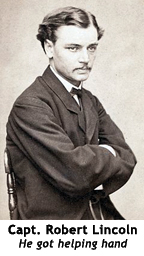|
Famous helping hand was required
to save life of another Lincoln
 A helping hand sometimes can save a life. A helping hand sometimes can save a life.
It did at least for Robert Todd Lincoln, the oldest son of President Abraham Lincoln.
Robert was standing on a crowded train platform in Jersey City, N.J., early in 1864 as passengers were purchasing sleeping car places. After making their purchases, passengers were pushing their way into the car.
“There was some crowding,” young Lincoln recalled, “and I happened to be pressed by it against the car body while waiting my turn. In this situation the train began to move, and by the motion I was twisted off my feet, and had dropped somewhat, with feet downward, into the open space, and was personally helpless.”
Lincoln was falling between the platform and the moving car. That’s when he was grabbed by the collar and pulled to safety. Robert turned to thank his rescuer and immediately recognized the man with the helping hand. It was Edwin Booth, one of the country’s most famous actors.
Months later, while serving as an officer on the staff of Gen. Ulysses S. Grant, Capt. Lincoln recalled the incident to his fellow officer, Col. Adam Badeau, who happened to be a friend of Edwin Booth. Badeau sent a letter to Booth, complimenting the actor for his heroism. Before receiving the letter, Booth had been unaware that the man whose life he had saved had been the President’s son.
It was only the spring of the following year that the two men recognized the “haunting irony.” That was after Edwin’s brother, John Wilkes Booth, assassinated President Lincoln.
Edwin said after hearing that his youngest brother had shot the president: “It was just as if I was struck on the forehead by a hammer.”
Robert Lincoln, who was among those present at Robert E. Lee’s surrender to Grant at Appomattox Court House, lived to be 82 years of age and had a life filled with oddities. His being either present or nearby when presidential assassinations occurred ranks high on the list.
Robert was not present at his father's assassination, as he had decided not to attend Ford's Theater with his parents. He was at the White House, however, and rushed to the Peterson House when his father was moved there following the shooting. Robert remained in attendance at his parent's deathbed.
At President James A. Garfield’s invitation, Robert was at the Sixth Street Train Station in Washington when the President was shot by Charles J. Guiteau on July 2, 1881, and was an eyewitness to the event. Lincoln was serving as Garfield’s Secretary of War at the time.
Then, at President William McKinley’s invitation, Lincoln was at the Pan-American Exposition in Buffalo, N.Y., where the President was shot by Leon Czolgosz on Sept. 6, 1901, though he was not an eyewitness to the event.
Robert himself recognized the frequency of these coincidences. He is said to have refused a later presidential invitation with the comment, “No, I’m not going, and they’d better not ask me, because there is a certain fatality about presidential functions when I am present.”
Born in Springfield, Ill., in 1843, Robert was one of two of Lincoln’s four sons to live to adulthood and the only one to survive into the 1900s. A successful attorney and later general counsel and president of the Pullman Palace Car Company, he also was Secretary of War under President Chester Arthur and was minister to Great Britain in the administration of William Henry Harrison. Robert died in 1926 and was buried at Arlington National Cemetery.
|

